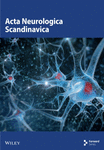Buspirone vs amitriptyline in the treatment of chronic tension-type headache
Abstract
Objectives - The aim of this study was to explore the efficacy of buspirone (BSR), in comparison with amitriptyline (AML) in the prophylactic treatment of chronic tension-type headache (CTH), in an open and randomized clinical trial. Material and methods - Twenty-six CTH patients (10 men and 16 women) were treated with BSR (30 mg daily) for 12 weeks. A parallel group of 32 CTH patients (12 men and 20 women) was treated with AML (50 mg daily). The major clinical parameters evaluated were the headache index (days with headache per month), the frequency of drug use for the acute management of headaches, the patients' opinion for the treatment and the Hamilton anxiety and depression rating scales.Results - During the study 9 patients dropped out (4 from the BSR group and 5 from the AML group). Twelve (54.5%) patients from the BSR group responded to treatment (&50% reduction in the headache index), compared to 17 (60.7%) from the AML group. In the BSR group, 14 (53.8%) patients reported various mild side effects (nausea most frequently), vs 21 (65.6%) of the AML group (mouth dryness more frequently). Patients treated with AML had better opinion and used less drugs for the acute treatment of headaches than the BSR treated patients.Conclusion - These results suggest that BSR may be effective in the prophylactic treatment of CTH, and that further investigation in a placebo controlled study, is needed.




